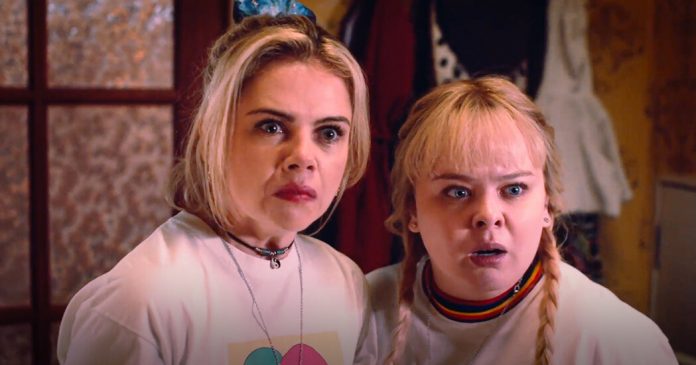“Derry Women,” the raucous Netflix comedy created by Lisa McGee, is about two long-simmering states of battle: the Troubles in Northern Eire and adolescence.
The sequence, which returns for its third and closing season Friday, is before everything a brutally humorous coming-of-age story, following 5 working-class buddies at a Catholic ladies’ faculty within the Nineteen Nineties. However the bigger political battle is ever-present, even within the present’s title. Within the pilot, Erin (Saoirse-Monica Jackson) introduces herself, through a diary entry, as being 16 years outdated and residing in “Derry — or Londonderry, relying in your persuasion.”
“Londonderry” is the official title, most popular by Protestant unionists who assist Northern Eire’s remaining a part of the UK; “Derry” is how Erin’s Catholic buddies and neighbors comprehend it. Within the intro, the digital camera sails above youths spray-painting over the “London-” on a highway signal, as a navy car passes and “Goals” by the Cranberries performs on the soundtrack.
That is “Derry Women,” made out of ’90s pop and spray paint. It’s a bubblegum-punk doc of rising up in a battle zone, with a feisty, optimistic spirit.
The earnest, awkward Erin and her buddies — ditsy Orla (Louisa Harland); bag of nerves Claire (Nicola Coughlan, “Bridgerton”); brassy Michelle (Jamie-Lee O’Donnell); and Michelle’s meek English cousin, James (Dylan Llewellyn) — know the instances they’re residing in. (In a working joke, every season opens with Erin’s mock-dramatic narration about her era’s plight.) However their issues are teen issues: cash, social standing, breaking guidelines and evading Sister Michael (Siobhán McSweeney), their sardonic, suffer-no-fools headmistress.
Like a teen in a strict faculty, McGee is an professional smuggler. In “Derry Women” she has sewed a social-political commentary into the stuffing of a wild comedy.
Practically each episode is constructed round a basic, gleefully executed sitcom premise — a rip-off, a highway journey, a wacky misunderstanding — which inevitably spirals into an avalanche of poor choices compounded by freakouts, ending, sometimes, in disciplinary motion or maybe a home hearth.
However the antics are grounded by a lived sense of the teenagers’ actuality, and the spiky chemistry among the many leads. McGee’s writing is riotous and alive; the dialogue ricochets like a pinball and makes use of curse phrases like punctuation. (I remorse that I can not quote a lot of the finest strains.) In “Derry Women,” teen girlhood is imagined as a sort of unstable chemical response; its characters, delightfully, have completely no chill.
That also they are residing in a spot riven by sectarian violence is background noise, an intractable complication of every day life. Within the pilot, the commute on the primary day of college is sophisticated by a bomb scare. In a later episode, the chums sneak off to Belfast for a live performance by the pop group Take That; Michelle brings a suitcase of vodka on the bus, then — after she denies possession of it to keep away from getting busted for underage ingesting — the “unclaimed bag” causes an evacuation and is destroyed by the bomb squad.
Adolescence is itself a sort of bomb menace; it too has a ticking clock. The characters of “Derry Women” are on the cusp of change, as is the place the place they stay. Season 2 ends with the 1995 go to to Northern Eire by the U.S. president Invoice Clinton to encourage the peace course of. As Season 3 begins, the ladies are going through what life may appear to be for them after commencement, whilst Derry contemplates what may come after a peace settlement.
This theme provides the seven-episode closing season a heightened sense of stakes, even because the chaos continues. One character is revealed to have a member of the family imprisoned due to the revolt; a couple of character is touched by demise within the household.
Above the whole lot looms maturity. Within the season premiere, the ladies stress about their outcomes on a vital faculty examination, and Claire’s meltdown captures their anxieties: “Passing these exams was our solely likelihood. We’re ladies. We’re poor. We’re from Northern Eire. We’re Catholic, for Christ’s sake!” (Coughlan’s transformations right into a fireball of molten panic are a pleasure to observe.)
The ultimate season underscores the percentages in opposition to the ladies, with a outstanding episode that flashes again to their dad and mom as members of the category of ’77. The elders, who’ve been comic-support buffoons for a lot of the sequence, had been as soon as children bursting with their very own hormones and punk revolt. (The episode options “Teenage Kicks” by Derry’s the Undertones, launched as “our nationwide anthem.”)
All this builds to the double-length finale, which takes place in 1998, when the ladies are turning 18 and Northern Eire is about to vote on the Good Friday Referendum, a power-sharing settlement between the warring factions. Possibly our heroines are only one generational hyperlink in a protracted chain of Derry ladies and Derry girls. However the finale suggests, buoyantly however not sappily, that issues is likely to be completely different — or no less than that it’s important to imagine that they could possibly be.
The comparatively quick run of “Derry Women,” like that of many swift British comedies, permits it to condense adolescence right into a fittingly packed house. A lot occurs in what, looking back, looks like such a short while. The sequence is ready to finish, pristine and in peak type, earlier than the onset of implausible ageing or the inevitable softening of characters that afflicts long-running sitcoms.
Don’t get me unsuitable: I might gladly have watched 200 episodes of “Derry Women.” However its speedy ending is consistent with the present’s unsentimental spirit. Like one’s personal teenage kicks, it couldn’t go on perpetually.


